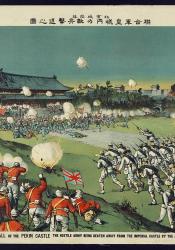Boxer Rebellion (義和團運動)
By the mid-19th century, Christianity spread and blossomed in China. Churches and Missionaries were all over the country, and this expansion casued conflicts with the local people.
On a microscopic scale, this was seen by the Chinese as a bunch of Westerners spreading their Western degeneracy and eroding Chinese Culture. At the height of the hysteria, rumours were spread where these Westerners were scooping out children's eyeballs and collecting their semen for medicine. (The original term is "陽精" which means "male vitality") Despite the missionaries' attempts to build hospitals and schools for the locals, they are often ignored by the Chinese Locals. In 1868, a plague broke out in a French Monastery that led to the deaths of many babies. This event was seen by the locals as the French Missionaries killing said babies, which led to the public stoning of a French Minister.
On a macroscopic scale, the Qing Dynasty was consistently losing their influence to neighbouring countries due to corruption and a failure to anticipate other countries. These repeated losses include: The Treaty of Nanking (南京條約) (1842), which gave Hong Kong Island to the British after the First Opium War; The Convention of Peking (北京條約) (1860), which gave the Kowloon Peninsula to the British and Outer Manchuria to the Russians after the Second Opium War; the Treaty of Aigun (璦琿條約) (1858), which ceded northern Manchuria to Russia; The Treaty of Tientsin (天津條約) (1858), which opened Chinese Ports to foreign trade and increased missionary activities to foreign countries; The Treaty of Bakan (馬關條約) (1895), which gave Taiwan to Japan. These are just part of the countless treaties where China was unable to defend itself towards foreign powers, but it is generally agreed by historians that the Treaty of Bakan was what ultimately pushed forward this movement.
Around 1900, a group of people named The Yìhétuán (義和團) was established. They branded themselves as a martial arts cult and claimed that by repeating their mantras, followers would be "Impenetrable by blades"and "Unharmed by Cannons". This group of people were backed by the Empress Dowager Cixi at the time. Not only because this faux-populist movement can make the regime appear less like an accountable for any retaliations since it was "self-organized", but the club also changed their motto from "反清復明" (Abolish Qing Restore Ming) to "扶清滅洋" (Help Qing Defeat the West). This mantra helped perpetrate a reduction in friction between the ruling Manchurians and the ruled Han-Chinese, thereby strengthening Cixi's grasp on the country from Han Nationalists.
After the repeated murders of foreign missionaries and Chinese Christians, the group ended up expanding their movement into Zhili (Modern day Hebei) and killed a German and a Japanese Embassy Staff Member. Cixi declared war against all these nations on June 15th 1900, which ultimately led to the Eight Nation Alliance between England, France, Germany, Russia, Japan, Austria-Hungary, Italy, and America. The battalion attacked China for its deeds and took over Beijing on August 15th. By October 26th, Cixi surrendered on behalf of China after escaping to Xi'an.
The surrender led to the signing of the Boxer Protocol (辛丑條約) (1901), which led to war reparations and a Chinese exclusion zone withinin Beijing for security reasons: only Westerners can live within this zone in order to prevent another massacre. This ended up being one of the most disgraceful events under the Qing Dynasty. It caused much distrust towards the Manchurian Regime amongst the Chinese populace and an increased support in Sun Yat-sen's revolution.
Academy of Chinese Studies. (一)列強不斷侵華與教案頻生: 中國文化研究院 - 燦爛的中國文明. chiculture.org.hk/tc/photo-story/1729.
Romanization of Treaty names are taken from Wikipedia.

